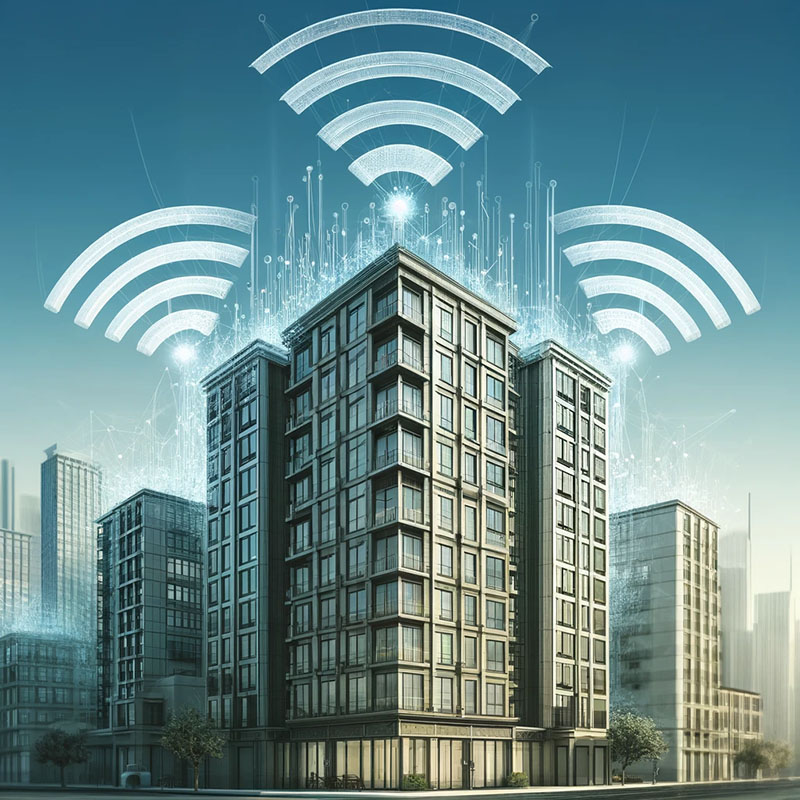Nowadays, a wireless internet connection is a requirement for most buildings. When visiting a coffee shop or lounging in an airport, connecting to complimentary WiFi is a simple given. But what does it take to provide internet to large spaces and for many users simultaneously?
WiFi for multiple floors or rooms is often regarded as MDU internet. Though relatively straightforward, choosing a provider for an MDU situation takes a few more steps than selecting a router for your average apartment. Here are all the steps to take to pick out the perfect WiFi supplier for your building, office space, or property.
What is MDU Internet?
Nowadays, extravagant apartment buildings and large office spaces want to provide steady, reliable internet to many users. If more people utilize the same connection, there are already worries about bogging down a WiFi’s quickness and download speed. Multiply that by many floors and square feet, and you’ll eventually run into trouble.
To mitigate this situation, employers and property owners use MDU internet services. MDU WiFi addresses the issues that could topple over a standard sturdy wireless connection. Today, apartment buildings nationwide provide reliable, often free, high-speed WiFi for all tenants as a luxury amenity.
MDU internet is specifically tailored to meet the needs of the entire building instead of individual apartments or tenants. This service often means looking into installing connectivity services like fiber optic cables to strengthen and widen WiFi reliability. Depending on the building’s requirements, a property or business owner will choose wired or wireless connectivity options.
Installing extended internet may include additional services to ensure that the WiFI is continuously running. These extra services for MDU Internet may consist of WiFi hotspot access, increased network security measures, and added customer support for tenants, clients, or employees.
Wireless and Wired Connections
Before purchasing an internet service for an entire building, you must address how you plan to connect your WiFi. There are two different connection methods to choose from: wired and wireless. Both wired and wireless connectivity measures have advantages and disadvantages that you must assess before purchasing.
Wired connections simply mean that a provider will install cables throughout a building to bolster a WiFi signal. Both ethernet and fiber optic cables are excellent choices for an MDU, but knowing the difference will help you decide which option is superior.
Ethernet cables connect to a central system like a server room or network distribution unit and then to individual units in a building. They reliably provide high-speed internet in an MDU situation, and they have been the most popular option for the past decade.
Fiber optic cables have become increasingly popular over the last few years. They use light signals to supply an internet connection, which gives ethernet cables a run for their money since they can transmit data extremely fast. Fiber optic cables’ main disadvantage is their undeniably pricey nature, so if you don’t need an apex internet connection, settling for an ethernet package may work better.
Wireless connections are standardly purchased for small spaces like two-floor houses and apartment units. Though wireless packages may not be the ultimate move for an MDU, there are still ways to install them for sufficient access.
A standard wireless connection, known as WiFi, uses routers that send signals into a general space. In an MDU setting, a WiFi modem can send a signal through a relatively large area, and you can purchase WiFi extenders for those hard-to-reach areas. Though this might be one of the least expensive options, WiFi signals are susceptible to interferences and experience lag times with multiple users. A wireless connection makes the most sense for office spaces or buildings that need to cover less area with fewer users.
Fixed wireless is the other option for a wireless connection package. It establishes a point-to-point system through a central antenna and different units placed throughout a space. Fixed wireless is excellent when you don’t have a large budget for internet services, but it can be obstructed by objects interfering with the signal. If laying down cables is too expensive or difficult for your MDU, then fixed wireless is your next best bet.
Scalability
Before choosing a service provider, you might want to look into the business’s scalability. Scalability refers to expanding or upgrading a service on demand. A provider offering scalability solutions is vital if you have an apartment building that keeps adding tenants or a company growing exponentially.
Internet solutions for expansion would accommodate the growing bandwidth of residents or employees over a short period of time. If you anticipate that your internet will accrue more users, a good provider will be able to give you flexibility and control over your WiFi’s bandwidth.
Customer Support
It is tricky to supply an internet connection to a large number of individuals through many floors and rooms. Before proceeding with your internet purchase, check the customer support services to see if they’ll provide excellent troubleshooting resources and installation guidelines.
For most people who aren’t exceptionally tech-savvy, a company that can provide services to alleviate technical issues is critical. Though customer support is a great resource for troubleshooting issues, this team should also be available for tenants and residents with billing inquiries. Since you may be an employer or property owner with less grasp on internet services and their expenses, having a reliable customer support person on call will easily help solve these disputes or challenges.
Now that you know the ins and outs of choosing an MDU internet connection, you can purchase from the best provider for your company or property. Whether installing fiber optic cables or ensuring internet service has a reliable customer team, you can select an MDU to satisfy every user.
